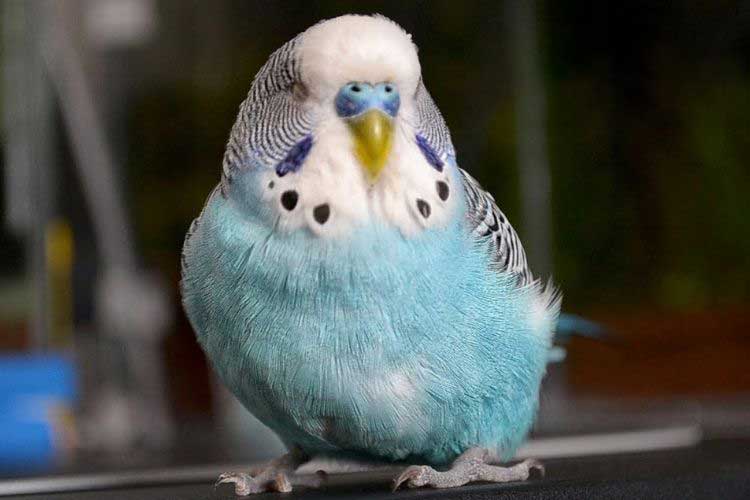Budgies offer something special to pet owners that no other species can – the joy and companionship of a feathered friend. But things can become difficult and distressing when they are dying or ill. It is up to the pet owner to notice any changes and save them.
So, how do I know if my Budgie is unwell? Your Budgie may show reduced activity, tail bobbing and heavy breathing, dirty feathers, decreased appetite, weight loss, and unusual droppings. If any of these signs are present, it is important to take your Budgie to a vet as soon as possible.
Understanding these signs can save your Budgie or offer the best comfort during its last days. Read on what to look out for.
How Do I Know If My Budgie Is Unwell? What are the signs of a bird dying?
Sadly, budgies may experience health issues or become frail due to age, just like any other living birds. It’s important to be aware of what signs to watch out for when they might not be feeling too well. Also, you need to be aware of their last days to ensure that your Budgie is given the best care possible. They include:
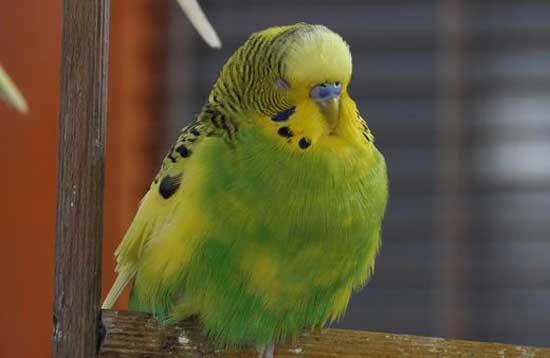
Reduced activity
If your Budgie is sleeping more than usual, not chirping or playing with toys, or seeming less active, this could be a sign of illness. A healthy budgie should be energetic and engaged in its surroundings. Budgies generally snooze during the darker hours of early morning and late afternoon.
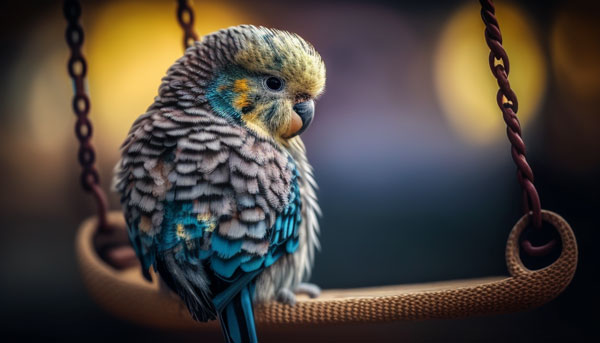
However, if they appear to sleep more than usual throughout the day, this could be a tell-tale sign of an underlying illness. Watch out for other symptoms such as not eating or drinking their regular amount, being unable to fly around your space, or avoiding interaction with people entirely.
Budgie is sick but still eating
Even if a sick budgie is still consuming food and water at an ordinary rate, it doesn’t necessarily mean they are healthy. It’s typical for ill birds to cease eating or drinking, but there are numerous examples where this isn’t the case.
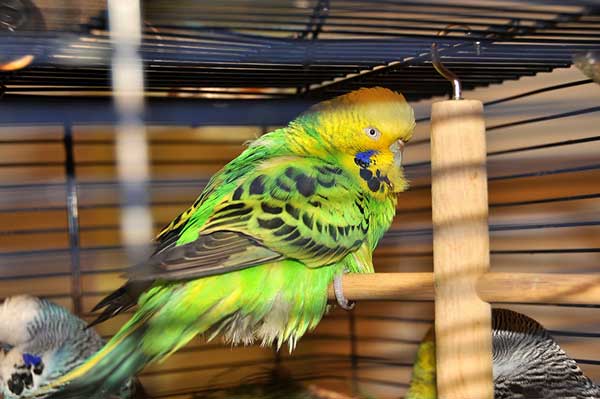
Some budgie diseases can lay beneath and only manifest with some other symptoms that don’t affect appetite.
It might seem strange, but this is fairly common with budgies. If you notice your Budgie eating and drinking normally but still acting sick or lethargic, this could signify something more serious.
Tail bobbing & heavy breathing
This could be a clear indicator of respiratory infection or pain when your Budgie starts to move its tail rapidly. Or maybe breathing heavily, especially when it is not active or in warm temperatures.
However, you must distinguish these signs from typical behavior that can occur following a flight or on hot days. When your Budgie’s state deteriorates, you may notice an unhealthy budgie nose and it’s breathing heavily and its tail bobbing rapidly.
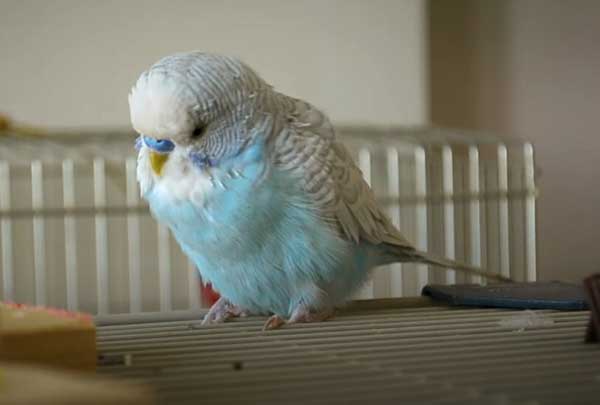
These are signs that it is in pain or having difficulty inhaling oxygen properly – a likely consequence of an untreated respiratory infection.
Dirty feathers and fluffiness
Budgies are renowned for their tidiness and spend much of their day grooming themselves. If your sick budgie’s puffed-up feathers appear brittle, dry, or unkempt, this could indicate an underlying health issue. Healthy Budgie feathers ought to feel soft and fluffy.
Similarly, if your Budgie’s feathers appear lackluster and overly dry, this could be a sign of dehydration or another underlying medical issue. Additionally, adhering to your bird’s body can be budgie mites and other parasites, giving their plumage an unappealing dusty-flaky look.
Head drooping
When your pet Budgie’s head droops, it is often a sign of sickness and can be an indication that they are in pain or struggling to breathe. If you spot this symptom, it could suggest that your bird is too weak to keep its neck upright, experiencing drowsiness, or even under the weather.
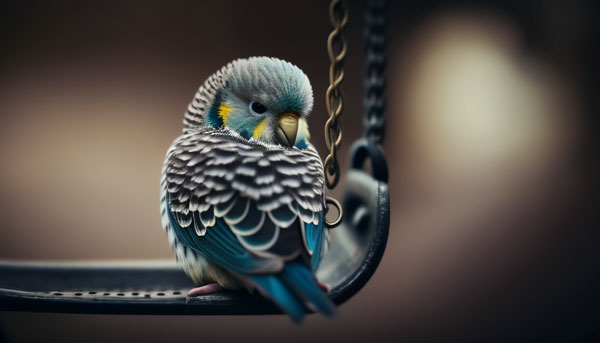
In these cases, it’s best to take them for veterinary care immediately. It is essential to remember that other aspects, such as dehydration or fatigue, may also explain why your Budgie is drooping its head. Therefore, evaluating and monitoring their overall wellness is crucial before making any assumptions.
What do budgies do when they are dying?
Every budgie’s response to dying may differ. Hence, it is critical to take note of their behaviors in case there is a sign that your feathered friend is nearing the end. But not all behavior indicates death, you should remain aware and observant.
However, there are certain telltale signs to watch for, such as decreased energy levels and mobility, lack of appetite leading to weight loss, and more frequent sleeping or resting.
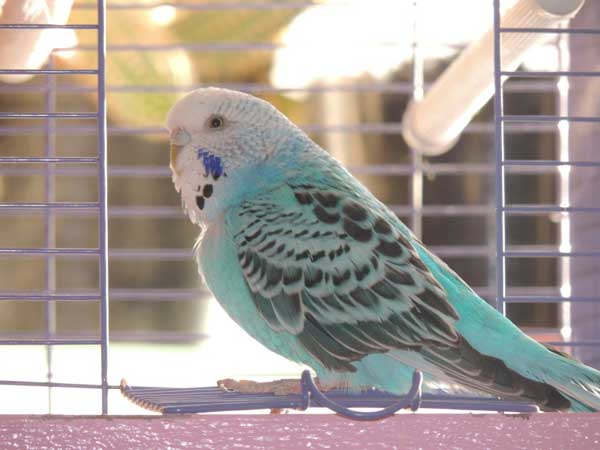
Accordingly, if your budgie suffers, you may observe signs such as lethargy, weakness, and difficulty breathing. Additionally, the bird’s feathers could lose their luster while its eyes may become clouded or sunken in appearance.
So, if any of these indicators are present, it is vital to obtain veterinary attention as soon as possible.
What if my budgie is puffed up and sleepy?
This could be a sign of something wrong – illness or injury. You may notice your budgie showing signs of physical discomfort with its feathers puffed up and constantly appearing asleep.
In more severe cases, this might also signify the impending death of your pet bird. Therefore, pay careful attention to any changes in behavior and seek veterinary care as soon as possible if necessary.
In general, budgies nearing the end of their life may become less active and less interested in their surroundings. They may also lose interest in eating or drinking and cling to one place instead of hopping around the cage or perch.
Note that other illnesses or conditions can also cause a budgie’s behavior. So it is best to have your bird checked by a veterinarian to determine the cause of their symptoms.
How do you save a dying budgie?
If your sick budgie looks like it may be at the end of its life, the best first step is to visit an avian expert. The veterinarian will be able to identify the problem and suggest necessary actions. This should take place immediately as budgies can rapidly worsen with time.
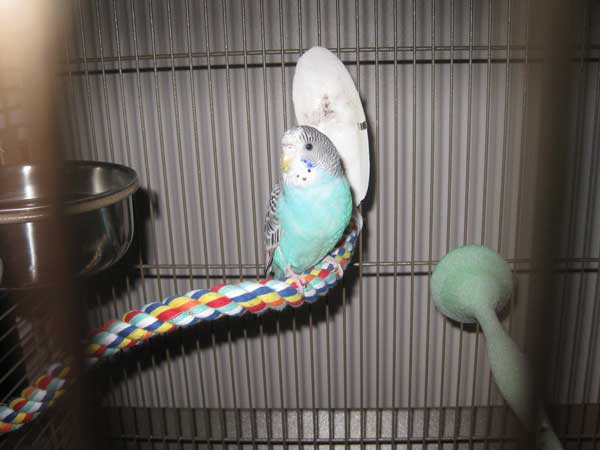
In the meantime, there are a few things you can do to help your budgie feel more comfortable:
- Ensure that the cage is clean and that your budgie can access fresh food and water
- Keep the cage in a quiet room, away from drafts and direct sunlight
- Provide a perch for your budgie, and ensure that the cage is large enough to move around comfortably
- If your budgie is injured, you may need to provide a temporary cage or restrict its movements to allow it to recover
Likewise, paying close attention to your bird daily is vital because many of the symptoms of an ill avian are often elusive.
It may be too late for treatment if you don’t detect signs until they become overt, and saving them could prove difficult. Stay up-to-date with your feathered friend’s behavior as soon as possible to prevent this from happening.
How To Treat A Sick Budgie At Home?
If you suspect your Budgie is ill, it is important to take them to a qualified avian veterinarian as soon as possible to get a proper diagnosis and treatment plan. You need to make sure that any underlying causes are addressed.
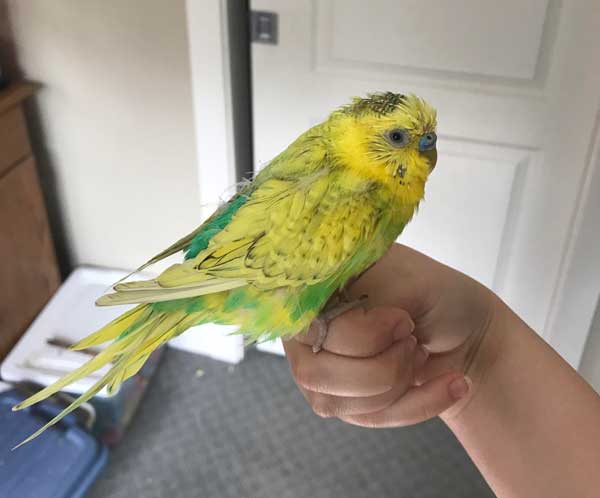
Thus, if your Budgie is in critical condition and you cannot get to a vet right away, some steps help you to stabilize them while you are en route.
Step 1. Comfort the Budgie
- Provide your Budgie with a comfortable, quiet environment and keep them out of drafts or direct sunlight.
- Ensure their cage is properly sized and stocked with food, water, and perches.
- When holding the bird, use a warm, soft cloth and speak soothingly to the Budgie.
Step 2. Provide Fluids
- Ensure your Budgie stays hydrated by providing them with a warm electrolyte solution like Pedialyte or Gatorade.
- Mix one teaspoon of sugar and just one drop of liquid vitamins in a teaspoonful of the solution.
- Then use a dropper or syringe to offer it to your pet bird.
Step 3. Boost Their Caloric Intake
- If your Budgie can’t feed independently, you should use a syringe or dropper to help.
- Treat them with nutritious options like boiled egg yolks and cooked quinoa.
- Those who still have an appetite but lack interest in food tempt their taste buds by offering small amounts of nutrition-rich snacks such as sunflower seeds and millet.
When Should You Seek Veterinary Care?
It is crucial that you take them to an avian veterinarian as soon as possible for a precise diagnosis and treatment when you find them sick. Your veterinarian can identify any underlying medical issues and provide specific advice on caring for your pet bird.
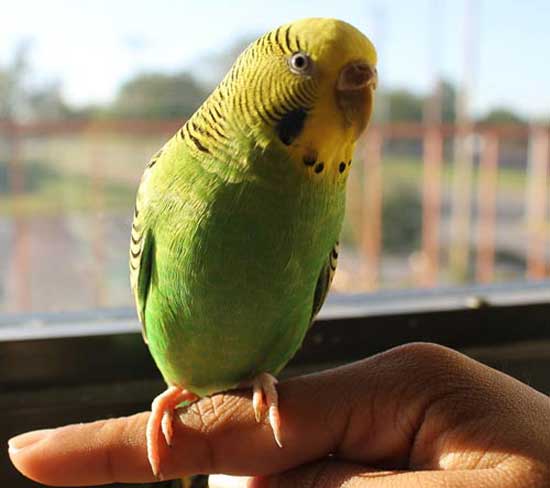
They can also prescribe medications and offer necessary treatments to quickly improve your Budgie’s health. Thus, adopting the above steps could help stabilize your Budgie’s condition and prevent them from deteriorating further.
On top of that, you must have a strong bond with your pet bird. And it is important to remember that you have to be realistic about their condition to give them the best chance of survival.
FAQs
These frequently asked questions can guide you further to take care of your pet bird in its critical situation.
Yes, a sick budgie can get better depending on the severity of its illness. Providing a clean and comfortable environment, proper nutrition, and prompt medical attention from a qualified avian veterinarian can greatly improve a budgie’s chance of recovery.
A budgie can be killed instantly by blunt force trauma, electrocution, choking, poisoning, or an acute health problem like an undetected heart attack. Budgies can also suffer from stress-induced illnesses, leading to sudden death if not treated in time.
Certain foods can be toxic to budgies and may cause sudden death if consumed. Avocado, chocolate, and caffeine are highly toxic to budgies and should be avoided. Other foods such as onion, garlic, plants of tomato, and apple seeds can also be dangerous to budgies if consumed in large quantities.
Covering a budgie’s cage at night is recommended as it helps them feel safe and secure, and it can also help reduce noise and distractions. The cover should allow air circulation but not so thin that the Budgie can easily rip it apart. A dark, lightweight fabric such as cotton or muslin is best in this case.
Conclusion
When it comes to our beloved budgies, it’s important to recognize the signs of a budgie dying slowly. Common signs to look out for include tail bobbing, reduced activity, and heavy breathing, dirty feathers, decreased appetite, weight loss, and unusual droppings.
If you spot any of these signs, it is important to take your Budgie to a vet as soon as possible. Additionally, providing your Budgie with a comfortable, clean environment, proper nutrition, and prompt medical attention from a qualified avian veterinarian can greatly improve their chances of recovery.
